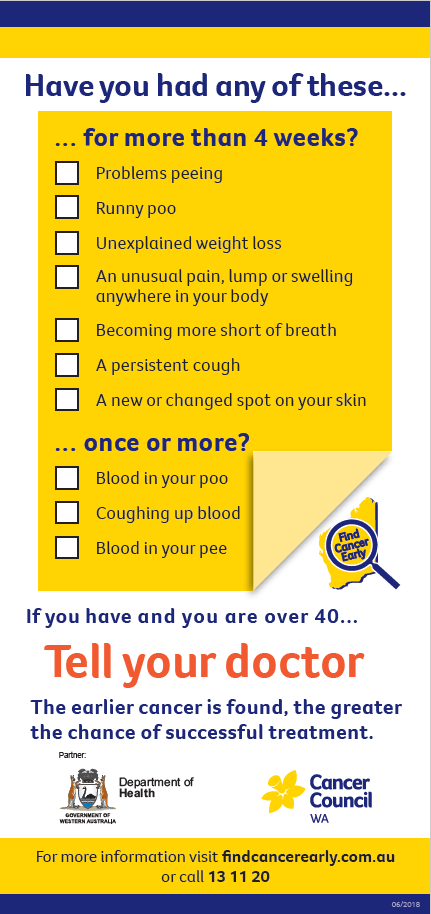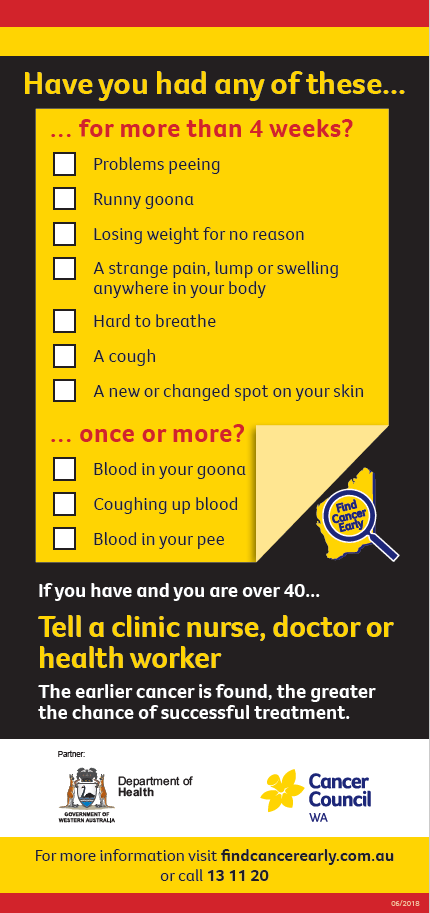Cancer is a disease of the body’s cells that starts off with one damaged cell. As time goes by, that damaged cell can make copies of itself and spread to other parts of the body and continue to grow. The cancer can then stop parts of the body from doing what they’re supposed to do and can make the body shut down.
For more information on what cancer is and how we can find it early, please watch the video below.
Cancer treatments have improved in recent years, and it is much easier to successfully treat cancer if it is found early. The more it spreads, the harder it is to treat. So, we must Find Cancer Early!
We encourage adults, especially those over 40, to be aware of some common symptoms of lung, prostate, breast, bowel and skin cancers (the five most common cancers). You can give yourself the best chance to find cancer early, by going to see a doctor, clinic nurse or Aboriginal health worker straight away if you have symptoms, so that treatment is easier, and you can be around longer to do the things you love doing with the people you love.
Early cancer symptoms
Tell your doctor, clinic nurse or Aboriginal health worker if you have any of these:
Or, if you have any of these symptoms for more than four weeks:
- Problems peeing
- Runny poo (diarrhoea)
- Unexplained weight loss
- An unusual pain, lump or swelling anywhere in your body
- Becoming more short of breath
- A persistent cough
- A new or changed spot on your skin.
It doesn’t mean you’ve got cancer – often, it turns out to be something else. If it is cancer, finding out and getting treatment early can make a big difference. For great tips on how to tell your doctor or trusted local health worker click here.
Coughing up blood
It may be nothing to worry about, but it could be a symptom of lung cancer. If you notice any blood when you cough, no matter how much or what colour, make an appointment to tell your doctor, nurse or Aboriginal health worker straight away. Click here to learn about other lung cancer symptoms.
Blood in your poo
The most common cause of blood in your poo is piles (haemorrhoids). Piles are caused by straining when going to the toilet. But blood in your poo can be a symptom of bowel cancer, so it’s very important to tell your doctor, nurse or Aboriginal health worker and get it checked out. Click here to learn about other bowel cancer symptoms.
Blood in your pee
The most common causes of blood in your pee are urinary tract or bladder infections, but it could be a symptom of a more serious condition such as prostate or bladder cancer. The best thing to do is to tell your doctor, nurse or Aboriginal health worker straight away and let them decide if further tests are required. Click here to learn about other prostate cancer symptoms.
Problems peeing
As men get older, they often have problems peeing (passing urine). They may find they need to pee urgently or more often, are unable to go when they need to, or experience pain when they do. These symptoms are usually caused by a common medical condition that causes the prostate gland to enlarge (known as BPH, or benign prostate hyperplasia). Less commonly, these symptoms can be caused by prostate cancer. If you’re having these problems for more than four weeks, you should tell your doctor, nurse or Aboriginal health worker. Click here to learn about other prostate cancer symptoms. For women, infections are the most common cause of pain and difficulty peeing. But needing to pee urgently or more often than usual should always be checked by a doctor.
Runny poo (diarrhoea)
Gastro and food poisoning are the most usual causes of loose, frequent poo (diarrhoea). This doesn’t usually last long and should go away within a few days. If you have noticed a change in your bowel habits lasting more than four weeks, it could be a more serious problem, like bowel cancer. Changes in your bowel habits can include a change in the time and/or how often you poo, or a change in how you go – straining to go to the toilet (constipation) and/or runny poo (diarrhoea). It is important that you tell your doctor, nurse or Aboriginal health worker and get it checked out. Click here to learn about other bowel cancer symptoms.
Unexplained weight loss
Small weight changes over time are quite normal. But if you have noticeably lost weight without dieting or increasing your physical activity and it has lasted more than four weeks, it is important that you tell your doctor, nurse or Aboriginal health worker. Even if you have been dieting in the past, you should still have any major weight loss checked out as unexplained weight loss can be a symptom of several different cancers.
An unusual lump or swelling anywhere on your body
Tell your doctor, nurse or Aboriginal health worker about any unusual lumps or swellings in your neck, armpit, tummy (abdomen), groin (at the top of your legs), or chest area (including breasts) that last for more than four weeks. Click here to learn about other breast cancer symptoms. A good time to check for unusual lumps and bumps is in the bath or shower.
Becoming more short of breath
It’s not unusual to feel out of breath every now and then. But if you notice that you’re feeling breathless more than usual, or most of the time, make an appointment to tell your doctor, nurse or Aboriginal health worker because it could be a symptom of lung cancer. Click here to learn about other lung cancer symptoms.
People often put breathlessness (being short of breath) down to getting older, being overweight or unfit. But if you or anyone else has noticed that you’re more out of breath than usual, get yourself checked out. Chances are it’s nothing to worry about, but if it’s a symptom of lung cancer, finding out and being treated early can make all the difference.
Even if you already have something wrong with your lungs that makes breathing more difficult – such as COPD (chronic obstructive pulmonary disorder) – tell your doctor, nurse or Aboriginal health worker if you find you’re more out of breath than usual.
A persistent cough
A persistent cough is a common symptom of a cold, flu or COVID-19. It often goes away after a week or so. But if it lasts longer than four weeks, or if an existing cough changes or gets worse, you should tell your doctor, nurse or Aboriginal health worker without delay. This is particularly important if you smoke, even if you have given up. Click here to learn about other lung cancer symptoms.
A new or changed spot on your skin
Skin cancers can grow quickly, so it’s important to become familiar with your own skin (including skin not normally exposed to the sun) through regular self-checks. Look for crusty, non-healing sores; small lumps that are red, pale or pearly in colour; new spots or freckles; or any moles that change colour, thickness or shape over a period of weeks to months. If you’ve noticed anything unusual, it’s important to tell your doctor, nurse or Aboriginal health worker.
![]()
![]()
The earlier cancer is found, the greater the chance of successful treatment.
If you can find cancer when it’s at an early stage before it’s had the chance to get too big or spread to other parts of the body, it can often be easily removed or treated, and we can get back to the people we love and the things we love doing. If the cancer has spread, treatment becomes more difficult, and your chances of survival may not be as good.
Share this information with family, friends, and colleagues, especially those over 40, so that they too have the best chance of easier and more successful treatment.
![]()


